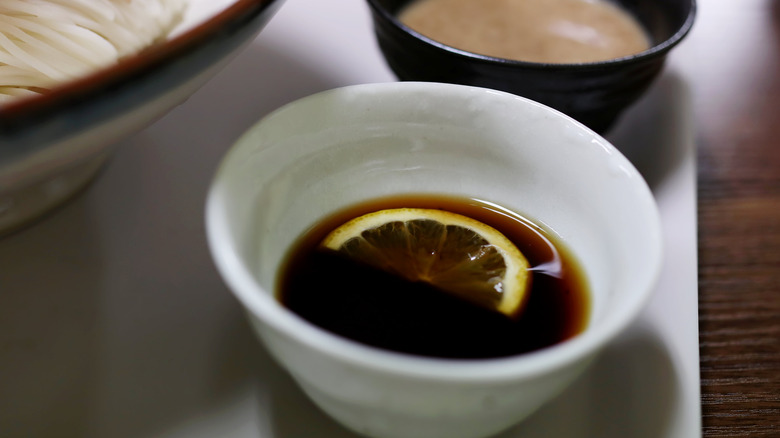Instead Of Extra Salt, Hit A Savory Dish With Lemon For A Flavor Boost
When seasoning a dish that hasn't quite hit its mark yet flavor-wise, it's instinctive for us to reach for salt. But in case you're out of this kitchen staple or you're watching your sodium intake, slicing up a lemon will do.
Lemon juice — or any kind of citrus, for that matter — is a great alternative to salt whenever you need to boost the taste and aroma of a savory dish. Not only does it add brightness to unseasoned food, but its acidity gets the mouth watering so we're able to detect and savor different flavors better. Acid does this for desserts and baked goods, too. That's why chefs rely on it to balance excess salt or sugar and add freshness to food that's rich and/or fatty. With lemon juice in particular, it's able to do all these without stealing the show. Remember, though, that the addition of lemon juice as seasoning is done at the end of the cooking process. Unless it's part of a recipe's primary ingredients or you're using it as a marinade to soften mushrooms or meat, cooking with lemon juice can inadvertently affect the color and taste of a dish.
Lemon's food-enhancing power isn't limited to its juice. The zest similarly packs flavor but isn't as acidic, hence its popularity as a garnish for both sweet and savory recipes and cocktails. Top your dishes with freshly grated lemon zest for an extra zing of citrus flavor, plus an appetizing visual and aroma.
Brighten up sauces and condiments with lemon juice
Harness this fruit's power to add a burst of flavor to food by adding it to your sauces and condiments as well. Lemon juice is a great substitute for vinegar when canning tomatoes for tomato sauce. The acid enhances the tartness and the sweetness of the produce, and it keeps the sauce's pH balance under 4.6 so it's safe to can. You can even make store-bought tomato-based spaghetti sauce taste as good as homemade by adding some lemon juice while you heat it.
Take a page from Asian cooking and put lemon juice to work in your soy sauce. This combination creates an excellent marinade, with the saltiness of the soy sauce tempered by the lemon's acidity for savory balance. It's also great as a dipping sauce. In fact, ponzu sauce is a Japanese cooking essential that makes gyozas taste more scrumptious, and two of its ingredients are soy sauce and lemon juice. Try our recipe for ponzu sauce with daikon and serve it with your next veggie stir-fry. Similarly, Filipino cuisine uses toyomansi or soy sauce mixed with calamansi citrus juice as a dipping sauce for fried, grilled, and steamed viands. Although it's more sour than calamansi, lemon works as a handy substitute. Enhance the balance of your lemon-and-soy-sauce combo's sweet, sour, and umami flavors by adding chili pepper, minced garlic, and diced onions.

